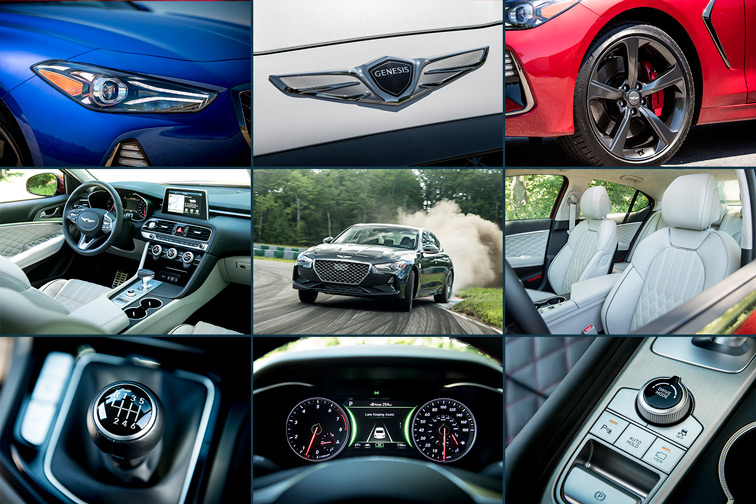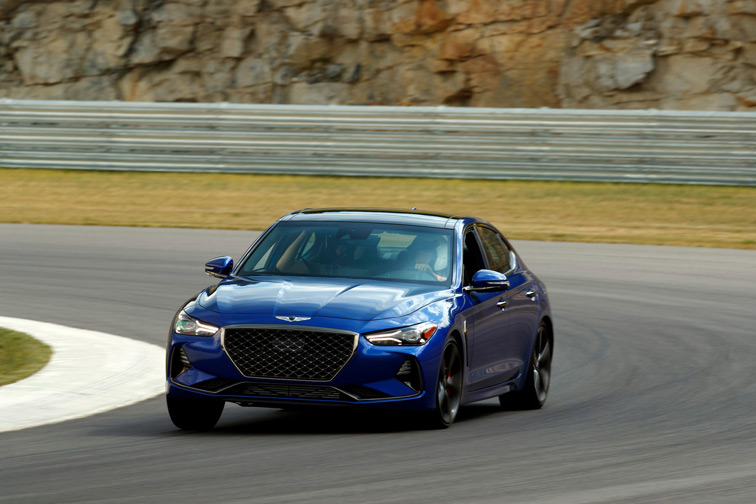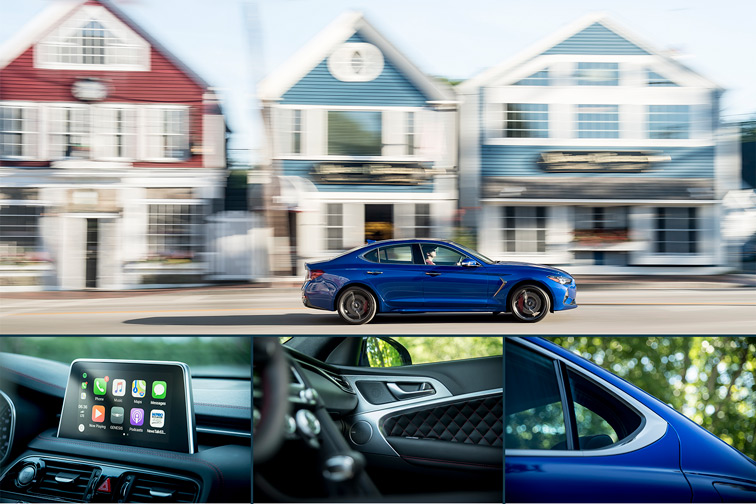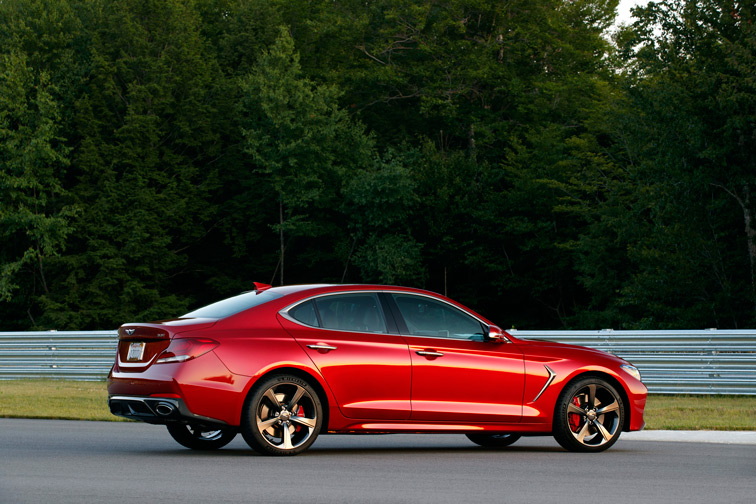2019 Genesis G70 First Drive Review
A Seoul-filled take on the European sports sedan

New England’s newest race track is a flowing river of tarmac laid over the beautiful New Hampshire countryside. The rolling hills are alive with the sound of tires squealing, tailpipes are singing, and my right foot remains glued to the floor as I scan the horizon for my next braking point. The track bends to the right, and there’s a bump capable of launching even most thoroughbred sports cars out of control. But I’m in a luxury sedan.
At a speed that would attract New Hampshire’s finest, the car handles the undulation with all the poise and lack of drama you’d expect from a next-generation German sports sedan, then settles down in time to slow for the next corner. But this is no German sports sedan. It’s the brand new, 2019 Genesis G70, straight from Korea.
The first G70s go on sale in August, so Genesis brought us to New England to try out the full G70 lineup on both the road and track, so we could form our own opinion on the latest challenger to the sports sedan hegemony. It may be newest kid on a crowded block, but already, the G70 deserves consideration in the segment’s upper echelons.

Wait. Genesis builds cars now? The band?
For those unfamiliar with Genesis (the auto manufacturer), it’s a relatively new luxury marque. Hyundai created it under its larger umbrella in 2015. In some respects, it’s a similar path that Toyota and Nissan took with the creation of Lexus and Infiniti nearly 30 years ago. Already, Hyundai has afforded Genesis a strong degree of independence when it comes to designing and engineering new cars.
Enter the G70.
With a price that ranges from the mid-$30,000s to the low $50,000s, G70 is the young brand’s first foray into the hyper-competitive premium sports sedan market. As such, it’s designed to go toe-to-toe with the likes of the BMW 3-Series, Lexus IS, Alfa Romeo Giulia, Infiniti Q50, Jaguar XF and so-on. When Genesis announced G70 to the world in 2017, it threw a bona fide concert in Seoul – complete with pop stars and a crowd in excess of 15,000 revelers – in lieu of a more traditional unveiling at a major international auto show like Detroit, Frankfurt, or Tokyo. The reason? Genesis intends to establish itself as the new face of Korean luxury.

OK, it’s new. What makes it special?
The 2019 Genesis G70 comes with your choice of a 252 hp, 2.0L four-cylinder engine, or a 365 hp, 3.3L, twin-turbo V6, plus your choice of rear- or all-wheel drive. There’s even a manual transmission option that comes with a host of enthusiast-oriented goodies. More on that in a second.
Unlike most cars in its class, every G70 includes a full suite of advanced safety and convenience systems as standard. On the Genesis, that means items like Forward Collision-Avoidance Assist, Lane Keeping Assist, a Driver Attention Warning System, and a Blind-Spot Collision Warning System that cleverly appears not just in the mirrors but on the windshield as well, thanks to the available Heads-Up Display.
You can use your smart phone (or watch!) to remotely start the car, lock the doors, or even set the climate control. If physically using your hands to remotely start your car’s A/C before you leave the office seems somehow antiquated, you can also give the car voice commands via Amazon Echo.
You May Also Like:
The 10 Best Road Trip Cars, According to Science
5 Sleeper Cars That Are Surprisingly Fun
The Most Environmentally Efficient Non-Hybrid Cars You Can Buy Today

The Joy of Driving translates nicely into Korean
Genesis doesn’t say this directly, but it clearly took aim at BMW when developing the G70. It’s no coincidence that, just before Genesis became its own brand in 2015,
Out on the road, G70 feels like a sports sedan should. Handling is crisp but never harsh, and the car exudes a driver-focused personality more akin to its German rivals than those from Japan. Over undulating pavement, the suspension soaks up the road without even a hint of secondary movement. That’s a technical term, but it means that the G70’s suspension has the confidence-inspiring ability to take turns without the rear-end attempting to step out. Over the beautiful New England backroads, G70 is among the best in its class.
The eight-speed automatic transmission is a gem. Tapping the steering wheel-mounted paddle shifters results in one of the most responsive gear changes in the market. When shifts should be crisp, they are. When shifts should be smooth, such as driving around town, they’re nearly imperceptible. The fact that it’s made completely in-house is a testament to the company’s engineering prowess – not even Rolls-Royce does that.

It’s not a track toy…unless you want it to be
Ask the G70 to do race track things, and the 3.3T’s exhaust emits a note that’s pleasing to the ears and evokes an aura of performance without being invasive. Power from the twin-turbo V6 is more than sufficient to convert the rear tires to a rubbery fog. On the all-wheel drive version, a so-called “drift mode” is designed to make any driver look like Vin Diesel.
The four-cylinder 2.0T weighs less and is more eager to turn into corners than its otherwise faster, more powerful stablemate. For those looking to maximize G70’s engaging experience, you can have the 2.0T with a manual transmission, which simply isn’t an option in many corners of the sports sedan segment. Genesis understands that only enthusiasts are likely to want a row-your-own gears option, so the six-speed choice includes upgraded brakes and a limited slip differential to help with acceleration out of corners – both borrowed from the 3.3T.
The 2.0T and the 3.3T have distinct personalities. Both are more than competent in any environment, and determining which is better is purely a matter of personal preference.

Sound, Style and Stitching
Android Auto and Apple CarPlay are standard, and the optional Lexicon sound system feeds 660 Watts through 15 speakers, while “music restoration” software counters the sonic pitfalls of streaming or MP3 compression. A surround-view monitor lets drivers see imminent obstacles from all angles, and the Heads-Up Display includes navigation and speed limit information, as well as readouts for the various safety systems.
For the non-tech attributes, three levels of interior trim include leatherette, leather, and an upgraded quilted leather option. The latter includes matching door trim that requires curved stitching to counter the natural curvature of the door. Though best appreciated in person, it’s a nice touch, and one that encapsulates the Genesis team’s attention to detail and build quality.
Stylistically, G70 borrows from both Japanese and German cues in places. The shape of the side windows – called a “Pharaoh’s Eye” in Genesis parlance – kinks up toward the back in a vaguely BMW sense, while other aspects of the front and rear are somewhat reminiscent of Infiniti. But this melting pot of influences gives the car a look all its own. The grille is very distinctly Genesis, and largely borrowed from its pricier G80 and G90 siblings. Already the young marque’s defining characteristic, it’s wide open and draws the front end to a visual point. The rectangle in the center stands out, maybe a bit too much, but it’s a necessary evil and an obvious reminder to passers-by that the G70 has a cadre of high-tech safety sensors hidden within.

The Verdict
The only thing that can really hold G70 back is the relative newness of Genesis. Mercedes has been known for its quality since – literally – the dawn of the automotive era, while BMW has been synonymous with the words “sports sedan” almost since they became a thing. In other words, the badge on the front of their cars is a time-tested intangible, and that matters to many would-be buyers. Lexus managed to find early success, thanks in no small part to the stellar reliability associated with its Toyota mothership.
Genesis has every opportunity to follow that blueprint, thanks to
Objectively, at least, there is nothing to prevent G70 from competing immediately with the crème de la crème of the sports sedan world.
And from the driver’s seat, it already does.
Written by humans.
Edited by humans.
 Aaron Miller
Aaron MillerAs a veteran automotive journalist, I have been fortunate enough to drive some of the most desirable cars on the planet and get to know some of the most important people in the industry. Before joining Capital One, I served as the Cars Editor for a major national website, and covered industry news and analysis for well-known automotive-specific sites. I also wrote feature articles and reviews for niche enthusiast websites. I’ve been obsessed with cars since—literally—before I can remember, with my collection of die-cast and slot cars taking center stage during my formative years. Simply put, for me, working isn’t really “work.”
Related articles
View more related articles